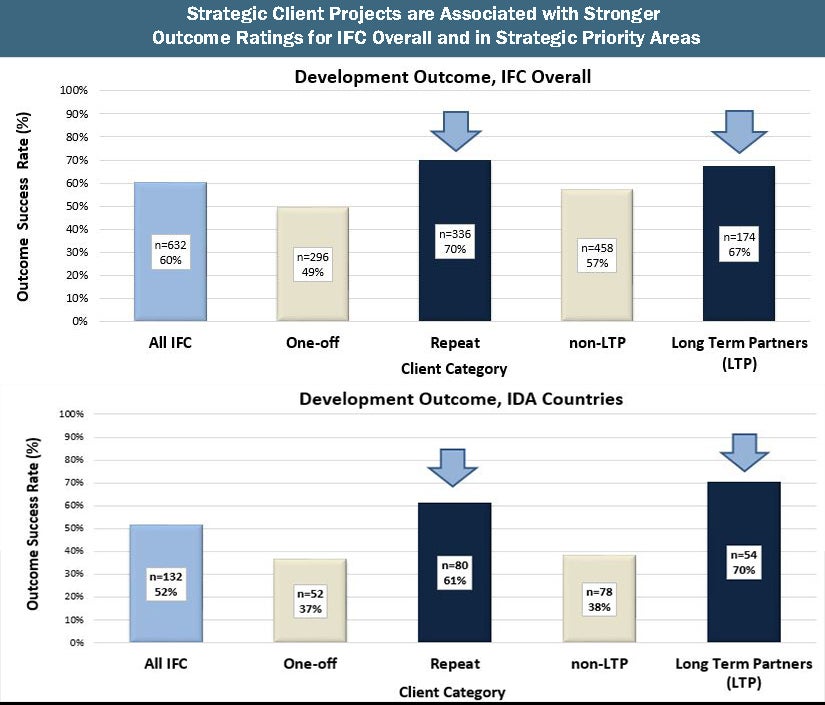Key Findings
-
The International Finance Corporation (IFC) became more client focused over the past decade, although it implemented only partially its strategic approach to client engagement. IFC tends to engage in repeat operations with its more sophisticated clients.
-
 IFC’s implementation of the strategic approach, though limited, has been associated with positive effects on IFC’s behavior and performance, suggesting that a fuller implementation could yield stronger results. Investments by strategic clients perform better than IFC’s average in terms of development outcome ratings, both overall and in IFC’s strategic priority areas.
IFC’s implementation of the strategic approach, though limited, has been associated with positive effects on IFC’s behavior and performance, suggesting that a fuller implementation could yield stronger results. Investments by strategic clients perform better than IFC’s average in terms of development outcome ratings, both overall and in IFC’s strategic priority areas.
-
Key objectives of IFC’s strategic client engagement have not been achieved, as shown by the lack of sustained increase in good quality business, of significant gains in IFC’s business efficiency, and of client satisfaction, and a limited ability to influence clients’ capacities and development orientation. A selection effect due to characteristics inherent in strategic clients — rather than learning from repeat projects – explains the difference in development outcomes between repeat and one-off clients.
-
IFC’s client engagement approach can be viewed as a relevant and timely adaptation to a changing world with multiple players in the private sector development space, more financing and advisory options available to private companies looking to invest in developing countries, and a more confident domestic private sector in emerging and even frontier economies.
-
Programmatic and country-based, client-focused initiatives aiming to move IFC farther upstream from its traditional engagement at the financial structuring stage (called IFC 3.0)—when projects have been largely developed—have had mixed results and have not been mainstreamed, indicating the challenges IFC 3.0 faces. However, such activities can support the ambitious global sustainable development goals and the expectations for an enhanced role for the private sector in achieving them.
-
The strengthening and more systematic implementation of a strategic approach to client engagement, fully integrated with market and country-focused upstream interventions, appears to offer good potential for supporting IFC’s strategic priorities and increasing its development impact.
Conclusions and Recommendations
Based on these findings, the evaluation contains a set of recommendations to strengthen IFC’s effectiveness:
Implement systematically the strategic approach to client engagement with focus on areas where implementation has lagged.
To do so IFC needs to:
- Adopt clear criteria for the selection and segmentation of clients according to IFC strategic priorities including for upstream project development, cascade and creating markets.
- Streamline procedures and processes for strategic client and strengthen criteria for additionality for strategic clients, including for the justification of incremental additionality in repeat projects addressing the same market failure.
- Identify areas of integration of client approaches with sector and country strategies and programmatic approaches.
Strengthen the client relationship management function to enhance IFC’s capacity to build a pipeline of new clients.
To do so IFC needs to:
- Establish clear accountabilities and incentives for strategic client relationship management.
- Strengthen the business development function and support systems by inter alia increasing the transparency and accountability for client interactions and their outcomes and integrating client management databases into IFC’s information architecture.
Enhance IFC’s capacity for upstream engagement on projects to increase the number and quality of IFC's pipeline of strategic clients. To do so IFC needs to:
- Strengthen the capacity to operationalize findings of country and sector diagnostic work to develop new clients and investment opportunities.
- Bolster IFC’s internal incentives and resources to systematize support for upstream approaches across IFC departments.








